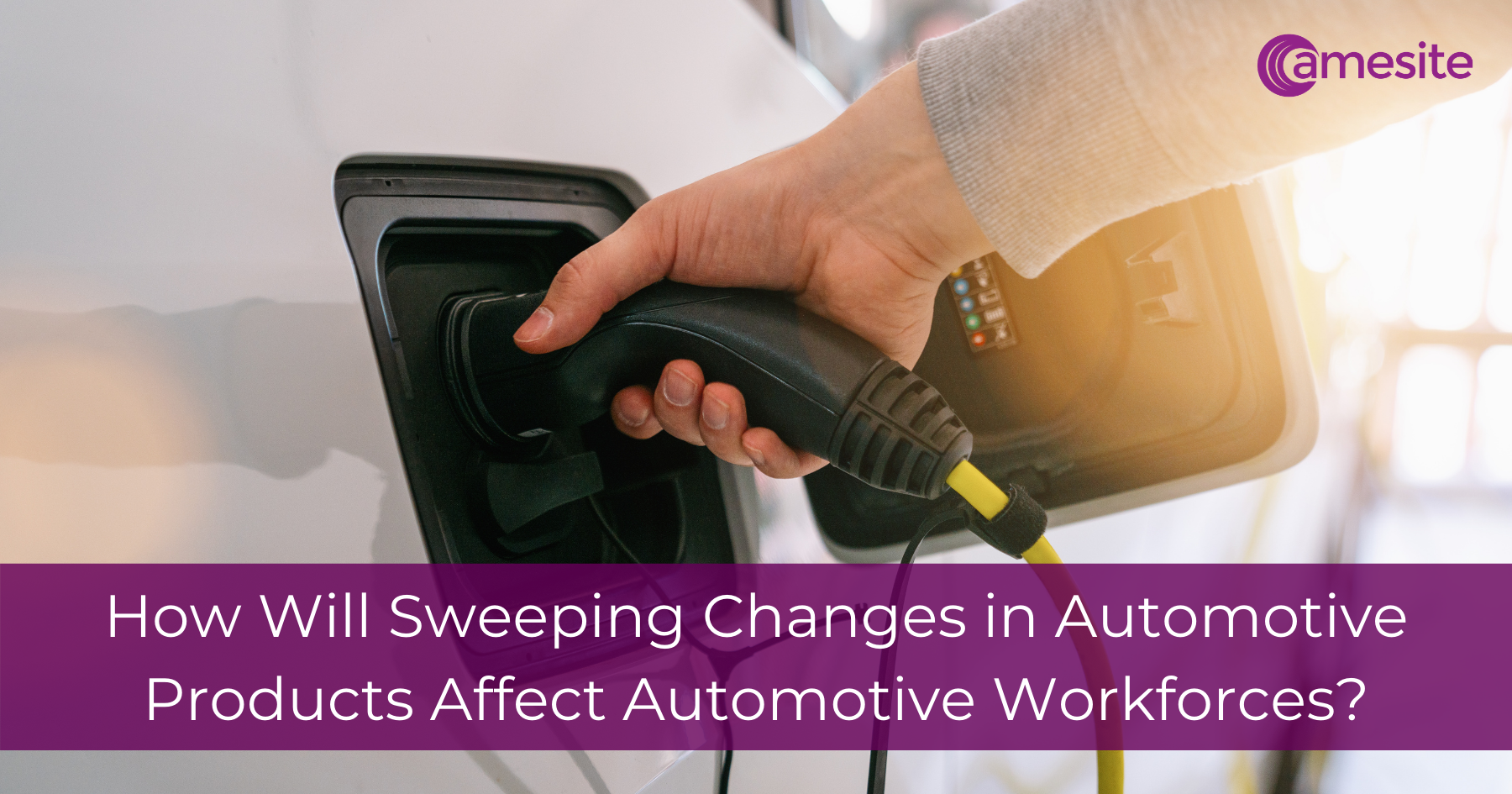 Back
Back

Few industries are experiencing the rapid transformation that the automotive industry is facing today. This essential industry, which is responsible for directly or indirectly supporting nearly 1 in 20 Americans financially [1] is now reinventing itself on an unprecedented scale. The coming dominance of electric vehicles, the rising demand for self-driving cars, the tightening of emission regulations, and the societal push for environmentally friendly business practices are driving this change. Spurred by technological advances and environmental concerns, this reconfiguration is bringing enormous changes to automotive products and automotive workforces. What do these changes mean for automotive workforces, and how should companies adapt?
These changes mean that the current automotive workforces likely lack the required skills needed for a technological transformation. Despite this, automotive companies must quickly embrace the new trends and technologies to stay competitive and relevant. Top automotive companies like Ford Motor Company, General Motors, Volkswagen, and Volvo are already embracing the modern trends in the automotive industry by expanding into the electric vehicle market and making public emission reduction goals.

Ford Motor Company has recently announced an electric Mustang, F-Series, and the battery-electric Mustang Mach-E. Ford also plans to be carbon neutral by 2050 and "use 100 percent locally sourced renewable energy for all manufacturing plants globally by 2035" [1].
General Motors is the largest US automaker and plans to decarbonize its portfolio. GM has an aspiration to eliminate tailpipe emissions from new light-duty vehicles by 2035 [2], promising to release 20 new electric vehicles by 2023.
Volkswagen, a leader in the shift to a more sustainable automotive industry, announced in December 2020, "it would reach 1 million in EV production by 2023, two years ahead of schedule, with 1.5 million planned for 2025" [3].
Volvo jumped on the bandwagon after unveiling its first fully electric vehicle in October 2019. Paired with this release was a commitment to decarbonization. Volvo says it will release a new electric model every year and reduce traditional combustion vehicles and hybrids production. By 2025, the company says that half of its sales will be electric, and the other half plug-in hybrids, with their non-electric motors produced outside the company [4].
The direction that the industry is taking is clear. The global shift to electric vehicles is underway. Enabled by the adoption of electric vehicle technology, the next significant change occurring in the automotive industry is the widespread acceptance and rollout of self-driving vehicles. A common motif in science fiction movies is now a reality.

Waymo is an autonomous vehicle business under the parent company Alphabet. Shocking their ride-hailing app customers, they announced over email that completely autonomous taxis would be offered soon [5].
Massive technological product shifts are occurring in the automotive industry. However, beyond these "outward manifestations of change are the innovations that will power the industry going forward: big data, advanced analytics, artificial intelligence (AI), automated back-office processes, and service robots" [6]. These technological innovations create a problem for scaling the automotive industry's efforts to move into the 21st century because it is advancing more rapidly than the traditional learning infrastructure.
New tech talent is not graduating with degrees encompassing all the necessary skills needed for the automotive industry's future. Additionally, current employees are not trained in these new essential skills and technologies. This quickly developing field creates a skill gap between the existing workforce and the necessary workforce for the automotive industry's future.
How Can Businesses Overcome Skills Gaps in Automotive Workforces to Keep the Automotive Industry Running Smoothly Into the Future?
The solution to overcoming skill gaps without massive unwanted restructuring and with continued use of their current workforce is two-fold: upskill existing employees and recruit skilled talent when necessary.
Automotive companies are facing a few issues right now in regards to labor:
A study done in the UK shows that "industries are expected to require more than 180,000 skilled people every year to maintain growth by 2024. With the current trends in STEM (science, technology, engineering, and mathematics) careers and education, they're predicting that they'll be more than 20,000 people short" [7]. This labor shortage statistic is from the UK alone. Globally, the shortage will be immense and could have profound implications when attempting to scale new-age automotive initiatives.
The solution to the problem doesn't require firing the workers to hire new ones. That would be a mistake because the hiring and firing process is costly. New hires like software engineers will also not understand the automotive production process like an experienced employee. To bridge the gaps, automotive companies must start providing training to upskill their current employees. Upskilling can take place on an online learning platform.

Using an online learning system can be a precious resource for a company. It can offer employers data on their employees' knowledge levels in certain subjects. Data can inform decisions about which skills employees can learn to meet the company's changing needs and which skills require new hires to acquire [8]. Recognizing which skills are teachable to current employees is essential when identifying pain points in the changing market.
Companies that invest in employee training in artificial intelligence (AI) and service robots provide a crucial advantage for themselves and their employees. These skills are necessary to stay relevant as machines inevitably replace certain positions in the industry. Knowledge of AI will become increasingly important as it is more commonly used in all aspects of the industry in the future, namely in self-driving cars.
Upskilling employees in big data and analytical skills will result in many benefits. Tech-smart vehicles will provide a collection of data that can be leveraged by companies who know how to use it. Advanced analytics will inform automotive companies of their consumer's behaviors and aid in developing marketing strategies. Analytics will play a massive role company-wide.

Training in systems that improve communications across the company and their partners will help streamline production and raise the bottom line. Having these communication skills will also allow the company to more easily outsource for skills that they do not yet have in-house.
The automotive industry of the future does not have to leave the workforce of the past behind. With training through an online learning platform that meets the automotive company's unique needs, the upskilled workforce will be more knowledgeable and competent than a new hire. Their years of experience and dedication to learning in order to stay competitive in the industry will add value to your company. Training is the bridge between the current workforce and the future workforce. Here are the key needs for companies who need to upskill effectively:
Automakers can start upskilling their employees today to leap ahead of the competition. It is detrimental to wait, amidst the labor shortage, for skilled tech labor that will lack automotive process experience and understanding.
Amesite Will Close the Skill Gaps in the Automotive Industry
Amesite is an easy to use, Artificial Intelligence software company that offers customized cloud-based scalable solutions to make world-class content creation easy and seamless. We create platforms and content for K-12, college, university, and business education and upskilling.
Amesite's online learning platform is the key to upskilling automotive workforces. Amesite's high-tech AI-powered online learning environment is custom-branded to each specific company to meet the unique needs of the employer and their employees. We have subject matter experts who design innovative and custom content for courses that provide excellent value to your employees. A host of self-paced, highly engaging, and intuitive courses can be ready for your company in as little as 30 days.
Amesite provided Ford Motor Company's employees with an online environment to upskill. "Our successful pilot with a diverse, global cohort of full-time professionals at Ford showed that the online learning delivered on our AI-driven platform was convenient and beneficial," said Amesite Founder and CEO Dr. Ann Marie Sastry. "A survey of participants showed that their interest in subject matter deepened, that the fresh content delivered via Amesite's AI helped them relate course material to real-world events, and that the quality of customer service and instruction were high."
Amesite creates outstanding learning experiences delivered on its advanced platform, providing a positive impact for employees. Using AI and advanced analytics to provide fresh content creates an important context for learning. Coupled with outstanding services, these experiences deepen professionals' interest in subjects important to their company's goals and spur creative ways to execute new practices. Amesite's unparalleled retention rate in the enterprise sector is 100%.
Changing automotive products does not have to mean changing the people who comprise your workforce. It just means you must provide them with the opportunity to learn and grow with your company.
Let Amesite help your automotive company upskill today. Request a Demo!
References:
[1] Center for Automotive Research. 2017. Contribution of the Automotive Industry to the Economies of all Fifty State and the United States.
[2] Ford. 2020. PROTECTING OUR PLANET. https://corporate.ford.com/microsites/sustainability-report-2020/protecting-our-planet.html#:~:text=We%20aspire%20to%20achieve%20carbon,manufacturing%20plants%20globally%20by%202035 Accessed Jan 31, 2021.
[3] General Motors. Jan. 28, 2021. General Motors, the Largest US Automaker, Plans to be Carbon Neutral by 2040. https://media.gm.com/media/us/en/gm/home.detail.html/content/Pages/news/us/en/2021/jan/0128-carbon.html Accessed Jan. 31, 2021.
[4]Automobile Mobile Magazine. Jan. 4, 2021. The Auto Industry Changes to Expect for 2020–2029. https://www.automobilemag.com/news/auto-industry-changes-to-expect-2020s/ Accessed Jan. 31, 2021.
[5] Forbes. Oct. 19, 2020. Three Major Technological Changes That Are Going To Redefine The Automotive Sector And Change Our Lives. https://www.forbes.com/sites/enriquedans/2019/10/19/three-major-technological-changes-that-are-going-to-redefine-the-automotive-sector-and-change-ourlives/?sh=331cd5c0532e Accessed Jan. 31, 2021.
[6] Tech Crunch. Oct 9, 2020. Waymo to customers: 'Completely driverless Waymo cars are on the way'.]https://techcrunch.com/2019/10/09/waymo-to-customers-completely-driverless-waymo-cars-are-on-the-way/ Accessed Jan. 31, 2021.
[7] Oliver Wyman. 2018. BUILDING THE AUTOMOTIVE WORKFORCE FOR THE FUTURE. https://www.oliverwyman.com/our-expertise/insights/2018/sep/automotive-manager-2018/resources/building-the-automotive-workforce-for-the-future.html Accessed Jan. 31, 2021.
[8] Cerasis. Jan 2020. Overcoming the Skills Gap in Automotive Engineering https://cerasis.com/skills-gap-in-automotive-engineering/ Accessed Jan. 31, 2021.
[9] Oliver Wyman. 2018. BUILDING THE AUTOMOTIVE WORKFORCE FOR THE FUTURE. https://www.oliverwyman.com/our-expertise/insights/2018/sep/automotive-manager-2018/resources/building-the-automotive-workforce-for-the-future.html Accessed Jan. 31, 2021.